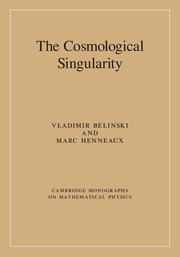Preface
Published online by Cambridge University Press: 24 October 2017
Summary
The first exactly solvable cosmological models of Einstein's theory revealed the presence of a very striking phenomenon: the Big Bang singularity. Since the time it was discovered in 1922 by Alexander Friedmann, a fundamental question has arisen as to whether this phenomenon is due to the special simplifying assumptions underlying the exactly solvable models or whether a singularity is a general property of the Einstein equations. This question was formulated for the first time by L. Landau in 1959.
The question was answered by V. Belinski, I. Khalatnikov and E. Lifshitz (BKL) in 1969. The BKL work showed that a singularity is a general property of a generic cosmological solution of the classical gravitational equations and not a consequence of the special symmetric structure of the exact models. Most importantly, BKL were able to find the analytical structure of this generic solution and show that its behavior is of an extremely complex oscillatory character, of chaotic type. Because it provides the description of a general solution of the Einstein equations (i.e., a solution depending on sufficiently many freely adjustable functions of space), the BKL analysis sheds light on intrinsic properties of Einstein gravity. Given the nonlinear character of the Einstein equations and the difficulty of finding exact solutions without symmetries, the BKL results are quite notable. They have a fundamental significance not only for cosmology but also for the evolution of collapsing matter forming a black hole. The last stage of collapsing matter will follow in general the BKL regime.
The chaotic oscillations discovered by BKL can be understood in terms of a “cosmological billiard” system, where the cosmological evolution is described at each spatial point as the relativistic motion of a fictitious billiard ball in the Lorentzian space of the logarithmic scale factors. This reformulation of the BKL behavior can be naturally extended to arbitrary matter couplings and dimensions of space-time, enabling one to show that the BKL regime is inherent not only to General Relativity but also to more general physical theories containing gravity, such as supergravity models.
Information
- Type
- Chapter
- Information
- The Cosmological Singularity , pp. xi - xiiPublisher: Cambridge University PressPrint publication year: 2017
